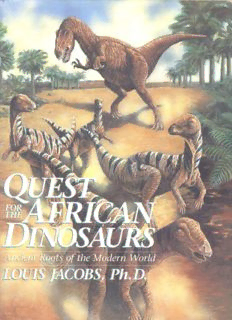
Quest for the African Dinosaurs: Ancient Roots of the Modern World PDF
Preview Quest for the African Dinosaurs: Ancient Roots of the Modern World
Copyright © 1993 by Louis L. Jacobs All rights reserved under International and Pan-American Copyright Conventions. Published in the United States by Villard Books, a division of Random House, Inc., New York, and simultaneously in Canada by Random House of Canada Limited, Toronto. VILLARD BOOKS is a registered trademark of Random House, Inc. Library of Congress Cataloging-in-Publication Data Jacobs, Louis L. Quest for the African dinosaurs/by Louis L. Jacobs. 1st ed. p. cm. Includes bibliographical references. ISBN 0-679-41270-0 1. Dinosaurs Africa. 2. Dinosaurs- Research Africa. I. Title. QE862.D5J28 1993 567.9'l'096 dc20 92-15080 Manufactured in the United States of America 9 8 7 6 5 4 3 2 First edition TO MY FAMILY, PAST, PRESENT, AND FUTURE, GREAT AND GRAND, IN-LAW AND OUT, CLOSE AND DISTANT, FATHER AND MOTHER, SISTERS (NO BROTHERS), NIECES AND NEPHEWS, AUNTS, UNCLES, AND COUSINS, AND WITH SPECIAL DEDICATION TO BONNIE, MATTHEW, AND MELISSA This thing we call existence; is it not a something which has its roots far down below in the dark, and its branches stretching out into the immensity above, which we among the branches cannot see? —Olive Schreiner (nom de plume, Ralph Iron), 1883 The Story of an African Farm PREFACE THIS BOOK is about fossils and about Africa. Thanks to the generous support of the National Geographic Society, most of it is based on my experiences and field work excavating fossils on the African continent. But it is about more than bones dug from the Earth. It is also about the people of Africa and how their legacies have shaped their lives. And it is about how such a thing as an expedition to find the ancient bones of the past can be put to use now to help build the future. The fossils in this book are those of dinosaurs and the animals that lived with them—weird crocodiles, strange mammals, and more familiar beasts, such as frogs and turtles. It is the whole suite, the once living community, that is most important, but dinosaurs catch the imagination first. Dinosaurs and Africa are two subjects that have a strange, if not sinister, appeal. Dinosaurs are scary giants; Africa is the Dark Continent. Those perceptions of dinosaurs and of Africa are partly myth, partly true; nevertheless the appeal they engender seems to be enduring for each. They are both exciting, true enough. But the view of Africa as the Dark Unknown is an old idea indeed. Africa is no longer as it was in the nineteenth century. How could it be? While some things never seem to change, in reality almost everything does. In Africa as elsewhere it is important to appreciate the past, and to enjoy the present, and PREFACE it is necessary to build for the future. Does digging for fossils in Africa fit that bill? You bet it does. In Western eyes Africa is perceived as a land for adventurers and explor ers. It seems that every outlander who has ever gone to Africa assumes that he or she has found something. Each has "discovered" some part of the continent. But while Africa is undeniably diverse and different, it has never been a lost continent—only unfamiliar, underappreciated, misunderstood, or forgotten. Every outlander who has ever gone to Africa has taken a part of it away and left something behind. The results have not always been good, nor have they always been bad, but they have all gone into the mix that makes up African society. I want to put in something good. I want to use my work on the bones of Africa to build the capabilities of one small place, right in the heart of Africa, so that the people can do on their own what I do with them now. I want to drive myself extinct, at least in terms of the paleontological development of the tiny country of Malawi. This book tells how I am doing it. But is it a good thing for Africa to focus the talents of a limited number of educated people on the study of fossils? Is that not frivolous? Is it necessary that a poor African nation devote resources to such a thing as fossils? That is for Africans to decide. At least we know that fossils are good, in a very warm sense, no matter where they are found, even Africa. Just ask a kid. Besides, it can be no more frivolous and no more unnecessary than in developed countries, where very respectable profits are made from the sale of dinosaurian accouterments and many an eager mind has opened to the won ders of science after being tapped by the excitement of the Lost World of the past. Moreover, by way of example, paleontology has certainly been good for the African nation of Kenya, judging from the lasting value of the Leakeys' work built there using the fossils of our collective human ancestry. The first chapter of this book defines the scientific issues involved in my African work and discusses how I got to Africa in the first place. It also provides the background of evolution and geology necessary for a fuller appreciation of why this paleontological work in Africa is worth doing. The second chapter is devoted to the major earthly feature of this part of Africa—a giant lake. The lake influences everything and everyone in the country, including its early European explorers, who marveled at it even as resident citizens and visitors do today. But the lake is also a geological feature, and understanding how it formed is essential to understanding why the fossils are
Description: